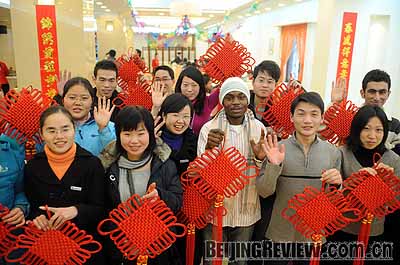|
 |
|
FESTIVAL MOOD: Students from Zhejiang University of Technology celebrate the Spring Festival on campus, with traditional good luck symbols(XU YU) |
Traditional ways of spending Spring Festival, or Chinese Lunar New Year, have changed dramatically over the years. Up to the 1990s it was a time for staying at home with family and eating traditional food.
In the early 90s, people began to travel, using it as a period to see the country or relax in the countryside.
From 1996, when a weeklong holiday was introduced around the festival date, the numbers traveling rose dramatically. By the following year, Spring Festival saw planes and trains fully booked across the country, as the trend for travel took hold.
"I just got married last year and took my honeymoon during Spring Festival. It was wonderful, so this year we have made plans to travel to Southeast Asia," said 26-year-old Gu Lidan, a civil servant of Hebei Province.
Short trips have also become a popular way to spend the Chinese New Year. Lu Qiang, who works in Beijing, plans to take his family to a hotel in the north of Beijing. "There are lots of things to do there," he said. "We can skate, bowl, and we don't have to bother about preparing dinner."
Time for friends
While vast numbers travel, many also choose to stay at home during the festival. KTV clubs are packed during the holiday as young people head out to enjoy themselves.
Sun Jiahao, a fresh college student from Guangzhou University, said, "When I was a child, getting new clothes and delicious food were the fun of the Spring Festival, and my parents wouldn't force me to go to sleep early as they usually did.
"It was a lot of fun for me, but now, as new clothes and delicious food are so frequent, and staying up is also common for us, I can hardly see the difference between Spring Festival and other days. Because of this I go to karaoke with my friends."
Fan Lei, a high-school student, has decided to enjoy a crazy Spring Festival, in order to take her mind off the looming college entrance exams. "I am really annoyed by sitting at home with piles and piles of books on my desk. This vacation is the most precious thing for me. I won't waste it by staying at home as I usually do."
In a survey conducted by Guangzhou University in 2008, 39.5 percent of young people said they preferred to surf the Internet, watch television or sleep during the Spring Festival, and 23.7 percent said they liked to spend the time with friends. Only 7.9 percent of young people said they preferred to spend the festival eating traditional food with family. A total of 43.2 percent of young people said they viewed the festival as a time to relax and have fun. As for traditional Spring Festival food, such as dumplings, glutinous rice pastry and candies, 34.2 percent of the people surveyed said they disliked it.
Staying put
For some college students Spring Festival is a time for recharging. Wu Lifei, a sophomore student at Renmin University of China, has chosen to stay in Beijing for an Internship during winter vacation, which means she can't go back to her hometown in Hunan Province.
"Since the employment situation is so bad, I have to make more preparations before that. There are so many graduates unemployed; I don't want to be one of them," she said.
Wang Xun, a postgraduate from the same university, has also chosen to stay in Beijing. "Modern society really puts great pressure on men's shoulders. We have to struggle to find a good job," he said.
As for missing the family dinner on the eve of the Spring Festival, Wu said it isn't so important. "I don't think sitting at the same table really means much," she said. "For me, the meaning of Spring Festival is to feel the care and love from my family. Whether we are together or not isn't so important." | 